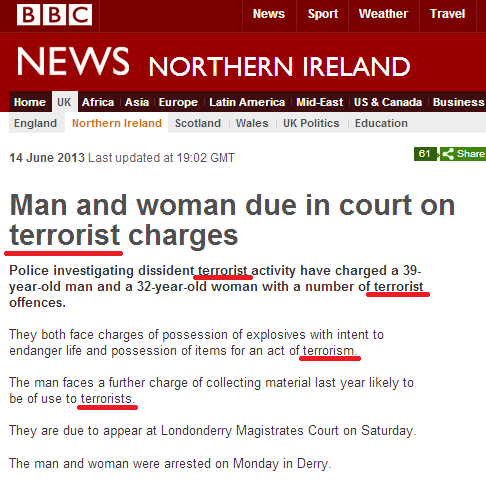On April 27th an article titled “Palestinian Authority ‘stops paying Israel for Gaza electricity’” appeared on the BBC News website’s Middle East page.
“The West Bank-based Palestinian Authority has told Israel that it will stop paying for electricity supplied to the Gaza Strip, Israeli officials say.
There was no confirmation from the PA. But President Mahmoud Abbas has threatened “unprecedented steps” to end the political division with the rival Hamas movement, which dominates Gaza. […]
On Thursday, the Israeli military’s Co-ordinator of Government Activities in the Territories (Cogat) announced that it had been notified by the PA that payments for electricity supplied to Gaza would stop immediately.”
The report provides readers with accurate background information relating to the chronic power crisis in the Gaza Strip.
“Israel currently provides Gaza with 125MW, which accounts for 55% of the territory’s usual electricity supply. Israeli media say the cost is about $11m a month, which Israel deducts from tax revenue collected on behalf of the PA. […]
On 17 April, the Gaza Power Plant, which produced about 30% of the territory’s electricity supply, was forced to shut down completely after exhausting its fuel reserves and being unable to replenish them due to a shortage of funds.
Days later, malfunctioning power lines coming from Egypt, which accounts for 15% of the supply, exacerbated the outages.”
However, the broader background to the article’s subject matter is less accurately portrayed.
“On 12 April, Mr Abbas said Palestinians faced a “dangerous and tough situation” and that he was “going to take unprecedented steps in the coming days to end the division [between Fatah and Hamas]”.
He did not elaborate, but the PA has already cut the salaries of civil servants based in Gaza and taxed Israeli fuel for Gaza’s sole power plant.
On Wednesday, Prime Minister Rami Hamdallah said the salary cuts would stay in place until Hamas moved towards reconciliation.
“I think there is a golden and historic chance to regain the unity of our people,” he said. “Hamas should relinquish control of Gaza.””
Those “civil servants based in Gaza” are of course the former PA employees who have been paid to stay at home for almost a decade. As for the PA’s policy of demanding payment of fuel taxes, it is not – as suggested by this report – new, having first been introduced in 2015.
The BBC’s report does not provide readers with any further information concerning the apparent reasons behind Abbas’ moves – as explained at the Times of Israel two days previously.
“Palestinian Authority President Mahmoud Abbas is set to issue a dramatic ultimatum to the Gaza Strip’s terrorist Hamas rulers, demanding that they either hand over governance of the area or face a funding freeze, sources close to the Palestinian leader said. […]
Among Fatah’s leadership there is a consensus supporting the measure. More than one senior official told The Times of Israel that there is no sense in maintaining the current situation.
“This time, Abbas is serious” one official said on condition of anonymity. “He doesn’t plan to drag things out and is unwilling to allow Hamas to continue to play games and drag its feet. It can either hand over authority in Gaza to us, or take responsibility and start to pay.”
Officials said that while Hamas is collecting tens of millions of dollars in taxes from the residents of Gaza, it is in no hurry to help the PA pay to run the Strip.
“It’s incomprehensible,” one official said. “In the past 10 years Hamas’s coffers have been enriched by more than a billion dollars in taxes, and yet they never shared the [financial] burden of the Strip. They invested most of it in their military wing.””
The ToI has also noted that:
“The renewed push by the PA to regain a foothold in Gaza comes ahead of Abbas’s meeting with US President Donald Trump at the White House next week. Ahead of the Washington confab, Abbas was under pressure to show that he represents all Palestinians, including those in Gaza.
In March, Hamas announced it would form an administrative committee to further its governance in Gaza. The announcement infuriated Abbas, who immediately began taking steps to squeeze Hamas out of power.”
As usual, readers of the BBC’s article were given a toned-down portrayal of the violent coup which led to the terrorist group taking control of the Gaza Strip in 2007.
“In 2006, Hamas won Palestinian Legislative Council elections. It reinforced its power in Gaza the following year after a violent rift with Mr Abbas’ Fatah faction.”
And yet again, the BBC could not resist promoting the false notion that the chronic shortage of electricity in the Gaza Strip is in part attributable to Israeli counter-terrorism measures.
“Gaza’s electricity supply has been also affected by restrictions on the import of goods imposed by Israel as part of a land, sea and air blockade that is now in its 10th year. Egypt is meanwhile blockading Gaza’s southern border.
Israel and Egypt maintain the blockades as a measure against attacks by Islamist militants based in Gaza.”
Interestingly, an almost identical statement is to be found in a document produced by UN OCHA to which a link is provided in this article’s fifth paragraph:
“Gaza’s longstanding electricity deficit has been also affected by the restrictions on the import of goods imposed by Israel as part of a land, air and sea blockade, now in its 10th year.”
Obviously if BBC journalists conducted their own research rather than blindly parroting claims made by a highly partial and politicised UN body, their reporting would be more likely to meet the BBC’s professed standards of accuracy.
Related Articles:
Revisiting the BBC’s 2013 PA funding audit story
More BBC disinformation on Gaza power crisis
Gaza Strip background the BBC does not provide
BBC News again avoids telling audiences real reasons for Gaza power crisis
BBC’s sketchy reporting on Gaza power crisis highlighted




